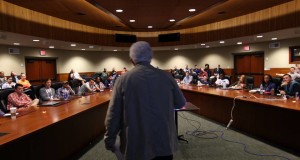(Photo credit by thundersaber)
It’s been ten years since I graduated high school. In those ten years, I got married (been married 5+ years now), deployed to Iraq (won the Army Journalist of the Year award), bought a house, was promoted to Sergeant First Class (which can take 15+ years to achieve), started a photography business (we get so many clients that I have to refer job requests to other photographers), fathered a son (Phoenix is the son I’ve always wanted, better than I ever deserved) and published two books.
I’m an independent spirit. I’m strong-headed and usually when I set myself on a project, I persevere until it’s complete.
Recently, I took a personality test through the Army which told me that I’m a “Driver.” In other words, I get things done.
So when it came to publishing “Amidst Traffic,” I hardly batted an eye at the idea of self publishing. Even though I knew I’d be going into it mostly alone and face a lot of stigma and dismissed criticism as a result.
But there were some encouraging trends to support my decision. After all, 2012 was the year that indie authors really made a mark for themselves in the publishing world.
With “Amidst Traffic,” I knew my book was good enough to get picked up by a traditional publisher (the title has won the International Book Awards and was a finalist in two other major indie book competitions), but I knew that in order to get to a publisher, I first needed to get an agent. And to get an agent, the process would be gruesome and time-consuming. Additionally, I knew that my odds were against me because “Amidst Traffic” is a short story collection, and collections don’t sell unless they’re released by well-known authors. I knew that publishers were more interested in picking up works that “sell” and less interested in literary quality.
So rather than wait a year-plust just to find an agent, and then wait (again) another year-plus just for a publisher to finally haggle me for the rights to the book, I decided to go at it alone. I entered the dark hallways of self publishing.
I knew what I was getting into. I knew that without a publisher, the work would fall on me to promote, market and convince readers to take a chance on my stories. I knew also that without a publisher I would miss out an all the connections and big-market reviewers that were out there. For example, lately I’ve been following an author by name name of Matt Bell (“In the House Upon the Dirt Between the Lake and the Woods” by SoHo Press) and almost every day on Facebook he’s posted news of his book being featured or reviewed by a major newspaper or news publication.
My mentality was: If “Amidst Traffic” really is as good as I believe it to be, then people will read it, and if sales come, then I will gain the attention of a publisher eventually.
And if the book doesn’t sell?
Well, that’s the beauty of self-publishing. If your book doesn’t sell, you just move on to another book. And you didn’t invest two years of your life trying to sell it to an agent and publisher, hoping that it might find any readers.
The key is (which is the key for both the Trad and the Indie author): keep writing. But at least as an independent author, my book is already out there, and people are already reading it. Already, “Amidst Traffic” has 30+ reviews on Amazon, which is more book reviews than most debut short story collections receive that were published by traditional presses. In the end, what really matters is reaching READERS, not big-name reviewers.
Yes, it’s true that the traditionally-published author typically sells 2,500 copies of his book, while the self-published one sells 250, but we are talking HARD copies in those stats. My book sells on Kindle 10 to 1 compared to my paperback copies. The digital revolution is changing the playing field to benefit the independent authors.
Every day, I read articles about self-published authors who are selling copies of their books in the thousands or have enven hit major bestseller lists. It’s becoming more and more of a reality. And even though my sale numbers for “Amidst Traffic” are nowhere near that, I have to keep in perspective one thing: Short story collections don’t sell. So, hopefully, the sale figures for my next book (and the one after that) will do much better.
In the meantime, the biggest challenge is figuring out exactly which marketing strategy works best. That’s been a bear to tackle. That’s the dark hallway that feels more like a labyrinth for me. Because the world of self-publishing is evolving so quickly, the marketing strategy that works one month for one author, may not work nearly as well the next month for another author. Right now I’m at the stage where I’m basically copying marketing tips that other indie authors have claimed to work, with mixed results.
But while I mix and match different promotional tactics, at least I’m not investing that time in querying agents and publishers.
Since “Amidst Traffic” was published in October of 2012, I’ve sold more than 100 paperback copies and have had more than 5,000 digital downloads. The reviews and feedback I’ve received have been extremely encouraging.
And in the end, it doesn’t matter so much HOW you reach your readers, so long as your book is available for them to discover.
As an independent author, I feel like I’m more in control over my book’s destiny this way. I can take ownership over its success and I can learn more quickly from its failures.
How you publish has become less important than how much you write.
Now, there’s a challenge that evens out the playing field to all writers.
What about you?
What compelled you to self-publish your book, and where do you stand on your decision now?
 Michel Sauret – Award-Winning Army Journalist | Independent Author Award-Winning Army Journalist, Independent Author
Michel Sauret – Award-Winning Army Journalist | Independent Author Award-Winning Army Journalist, Independent Author







Hi there! I stumbled upon your website while doing research on — wait for it — how to market one’s self-published book, so I thought I’d browse a bit and read some more posts.
I published my first book (“How to Get a Job in Social Media”) via Kindle Direct Publishing a couple of weeks ago and am now in the thick of marketing it. I’m also juggling my roles as a wife, mom to 4 active rescue dogs, foster mom to one recovering from heartworm, rescue volunteer, and president and founder of a fast-growing digital marketing agency. In other words, I — like many, many other authors — squeeze as much time as I can in between my other commitments to write my book and get it out there as fast and as well as I can.
I’m really glad that I went the self-publishing route for this book and will plan to write and self-publish more in the near future. I wrote it mostly as a lead-generating tool for my business and, well, to be able to prove to myself that I can finish a project and see it through to the end. I do have another book, however, that I’ve been working on for years. It’s a historical fiction novel set during World War II, and I hope to be able to attract a traditional publisher for it. I have at least one agent interested in reading it and hopefully representing me, so that’s step one there. Part of me wants to go that route because I just want to see what it would be like to be an “[insert major publishing house here] Published Author,” and another part of me wants to have a partner in this extremely difficult journey of being a writer and author.
Still, again, I do want to self-publish more, and not just to support my business. Writing is such a bear, but I love it so and can’t imagine not writing any more than I can imagine not breathing. It was such a rush to see my book and my name actually listed on Amazon and to call myself an “author.” I want to feel that again, and soon. 😉
Thanks for all the great tips you offer self-published authors!
Cheers,
Marjorie
Marjorie!
Excellent to hear from you. It is a thrill to complete a book and get it out there in the market. I actually find the marketing and promotional aspect more of a bear than writing itself. I’ve shared a few thoughts on marketing in the past on my blog and you’ll see a couple more of them appear on this blog in a few weeks.
Keep on coming back! Hopefully I can be of help by sharing my own experiences with you and other authors.
I honestly believe that (now) there is no difference between being self-published and traditionally published. What really matters is reaching an audience. Publishers make that aspect easier, but I will always be a believer in taking ownership over my own work as long as I publish books.
God bless!
Michel